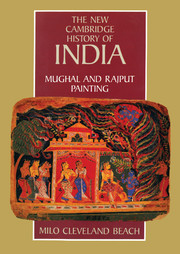Book contents
- Frontmatter
- Introduction
- 1 Painting in North India before 1540
- 2 1540–1580: Painting at Muslim courts
- 3 1580–1600: The new imperial style and its impact
- 4 1600–1660: Mughal painting and the rise of local workshops
- 5 1660–1700: The growth of local styles
- 6 1700–1800: The Dominance of Rajput Painting
- 7 1800–1858: Traditionalism and new influences
- Appendix
- Bibliographical essay
- Index
- The New Cambridge History of India
- References
3 - 1580–1600: The new imperial style and its impact
Published online by Cambridge University Press: 28 March 2008
- Frontmatter
- Introduction
- 1 Painting in North India before 1540
- 2 1540–1580: Painting at Muslim courts
- 3 1580–1600: The new imperial style and its impact
- 4 1600–1660: Mughal painting and the rise of local workshops
- 5 1660–1700: The growth of local styles
- 6 1700–1800: The Dominance of Rajput Painting
- 7 1800–1858: Traditionalism and new influences
- Appendix
- Bibliographical essay
- Index
- The New Cambridge History of India
- References
Summary
In the A’in-i-Akbari, Abu’l Fazl named the major painters at Akbar’s court, beginning with Mir Sayyid Ali and Abd as-Samad. Third on this list, which seems to be hierarchic, is Daswanth, of whom it was written:
Then there was Daswanta [Daswanth], the son of a palanquin-bearer (kahar), who was in the service of this workshop and, urged by a natural desire, used to draw images and designs on walls. One day the far-reaching glance of His Majesty fell on those things and, in its penetrating manner, discerned the spirit of a master working in them. Consequently, His Majesty entrusted him to the Khwaja [Abd as-Samad]. In just a short time he became matchless in his time and the most excellent, but the darkness of insanity enshrouded the brilliance of his mind and he died, a suicide. He left several masterpieces.
The Akbarnama narrative dates the death of the painter to 1584, and corroborates his insanity and suicide.
The character of Daswanth as an artist is elusive, for few of his works exist. A signed and certainly authentic page is found in the Tutinama and provides further evidence for that manuscript’s imperial origin and Akbar period date; the illustration is early and immature, however. While he must have worked on the Hamzanama as well - its dates coincide with the years of his greatest activity in the court workshops - successful attributions to his hand have yet to be made. The greatest, fully mature illustrations by Daswanth known to us are in a Razmnama (Book of Wars) manuscript begun in 1582. These are paintings that he designed, but did not fully execute.
- Type
- Chapter
- Information
- Mughal and Rajput Painting , pp. 39 - 67Publisher: Cambridge University PressPrint publication year: 1992

